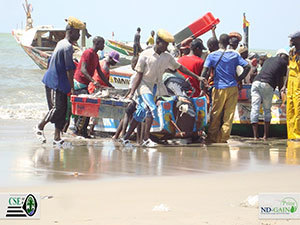
In Senegal, efforts to counter the effects of rising sea levels and ocean storms have produced a dike that reclaims hundreds of acres of land for rice. A seawall protects homes, and beach restoration is saving thousands of tourist-related jobs. In India, Indonesia, Kenya and Vietnam, a unique social venture called “Healthy Family” helps address barriers to health care access such as the limited distribution of medicines.
These two separate and unique projects have won the University of Notre Dame Global Adaptation Index’s coveted 2014 Corporate Adaptation Prize. The annual award reflects contributions to awareness, science or action in creating resilience to climate change and applies to multinational and local corporations working on projects in countries ranked below 60 on the ND-GAIN climate adaptation index.
The 2014 winners, honored at a New York City event at Baker & McKenzie in connection with Climate Week NYC and the United Nations Climate Summit, are:
- The Centre de Suivi Ecologique (CSE), based in Senegal, for its projects in three urban coastal areas with economic importance for fisheries and tourism and affected by coastal erosion. The project is a partnership between the Centre, the Senegalese government and Dynamique Femmes, among others, and is financed by the Adaptation Fund.
- Novartis International AG for creating Social Ventures — shared-value business models that complement philanthropic and zero-profit initiatives — and its Healthy Family initiative that uses both social and business components working together to create sustainable solutions.
“ND-GAIN aims to enhance the world’s understanding of the importance of adaptation,” said Joyce Coffee, ND-GAIN’s managing director. “Given the impact droughts, fires, floods and superstorms will have on the bottom line, we encourage corporations of every size to consider opportunities to increase resiliency where they do business.”
Award recipients applauded the purpose of the annual competition. “We aim to improve global health. We’re honored that our work to improve health education and access in India has been recognized by ND-GAIN,” said Jürgen Brokatzky-Geiger, global head of corporate responsibility at Novartis. Mamadou Honadia, chair of the Adaptation Fund Board, said of the Centre project, “We’re working to increase resiliency along the coast, thereby improving livelihoods for thousands and enhancing the investment environment.” CSE’s Dethie S. Ndiaye noted, “Through the ND-GAIN prize, we show the world that local collaborations can help protect vulnerable populations.”
Submissions were received representing projects in more than 30 countries and more than 20 topics from forestry, water and food to energy and health. Submissions were evaluated on their measurable adaptation progress, scalability, market impact and partnerships.
The ND-Global Adaptation Index Corporate Adaptation Prize Winners demonstrate that scalable, corporate-driven climate adaptation is happening around the world and can inspire leaders from all sectors to galvanize initiatives that save lives and improve livelihoods in the face of global shifts.
Judges selecting the two 2014 Corporation Adaptation Prize winners were Stephen Cheney, retired brigadier general, USMC, and CEO of American Security Project; Loren Labovitch, emerging market growth and partnership director at MWH Global; Amy Luers, climate change director at Skoll Global Threats Fund; Jesus Madrazo, international corporate affairs lead at Monsanto Co.; Danielle Merfeld, global technology director at GE; Raj Rajan, RD&E vice president and global sustainability tech leader at Ecolab Inc.; and Carolyn Woo, chief executive officer and president of Catholic Relief Services.
Past winners of ND-GAIN CAP include Monsanto for its Water Efficient Maize for Africa Project in partnership with the Gates Foundation and USAID and PepsiCo for their i-crop “more crop per drop” precision agriculture technology in 2013. In 2012, the winners were Ushahidi for its Crowd Source Technology Platform, which helps communities communicate during crises; Positive Innovation for the Next Generation for its disease surveillance and mapping project in Botswana; and MEDA for its Technology Links for Improved Access and Incomes, which provides rural farming families access to agricultural technology.
GAIN was founded in 2010 as the world’s first private sector-led, nonprofit organization created to save lives and livelihoods in developing countries by promoting adaptation solutions. ND-GAIN moved to Notre Dame from Washington, D.C., in April 2013. It is the world’s leading index showing which countries are best prepared to deal with national security risks, droughts, superstorms and other natural disasters that climate change can cause. ND-GAIN is housed in the University’s Environmental Change Initiative.
Contact: Joyce Coffee, managing director, Notre Dame Global Adaptation Index, 312-894-9028